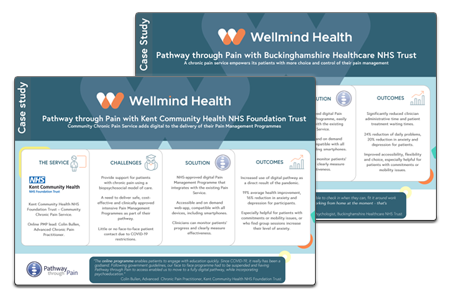THE STUDY 
A Randomised Waitlist Control Trial
"Investigating the Impact of an Online Mindfulness Intervention on Work Situation Awareness"
Conducted in 2019
by Dr Emma Sanchez-Walker
now Clinical Psychologist at Guy's and St Thomas' NHS Foundation Trust
PARTICIPANTS 
UK-based call centre employees at Zurich Insurance
Mixed age range and gender
Total of 133 participants whose working days were based in an office, at home or a mixture of both
The majority of participants worked full-time, in a traditional working pattern
THE COURSE 
Be Mindful: An asynchronous online programme of Mindfulness-Based Cognitive Therapy produced by Wellmind Health
NHS-approved and clinically validated in healthcare settings
Incorporating recognised survey-based assessments and anonymised analytics to report on clinical outcomes
OUTCOMES 
Be Mindful demonstrated significant, measurable mental health improvements for course completers, averaging:
63% reduction in depression
58% reduction in anxiety
38% reduction in stress
Continued benefits were evidenced at the 6-month follow-up post course completion
Participant Feedback
Amanda
Participant Testimonial
Katie
Participant Testimonial
Anonymous
Participant Testimonial
SUMMARY
Conducted by Dr Emma Sanchez-Walker, the aim of this study was to investigate the impact of a 4-week online mindfulness-based intervention on work situation awareness and other measures of occupational health with a non-clinical population of workers in mixed home/office environments.
Recognised Benefits of Mindfulness
Previous research has demonstrated clear, measurable benefits of mindfulness practices. These include decreasing stress, burnout and illness symptoms including anxiety, and promoting coping capabilities, purposefulness in life, and the experience of positive emotions.
Conversely, the cost of not treating mental health in occupational settings is significant., resulting in a reduced quality of life and possible impact on physical health for employees, and productivity and financial losses for employers.
The Study
Diverting from much of the purely conceptual research that had gone before, this study sought to demonstrate whether a mindfulness intervention could measurably improve the job satisfaction and wellbeing of employees.
A randomised waitlist control design was utilised, with three and six month follow-ups. Participants were UK-based employees of a large international insurance company.
- Of the 133 participants, 49.6% participants reported being office-based, 16.5% home-based and 33.8% were a mixture.
- The sample was aged between 20 to 62 years and was mainly female (64%).
- The majority of participants worked full time, in a traditional (Monday to Friday) working pattern.
RESULTS
The study provided clear evidence for the effectiveness of online mindfulness interventions in a workplace environment.
The unique finding of this study was that an online mindfulness intervention improved employees’ awareness at work. Participants who completed the intervention reported a significantly greater positive change, when compared to the change reported by waitlist control participants, in levels of:
- work situation awareness
- mindful awareness
- sleep quality
- anxiety
- fatigue (acute and chronic)
- work-related rumination
The effects held at three months for affective rumination and problem-solving pondering (measures of work-related rumination), and at six months for work situation awareness and anxiety.
This study provides support for the effectiveness of a 4-week online mindfulness program for improving work situation awareness, mindful awareness and sleep quality, and reducing anxiety, work-related rumination and fatigue.
Results showed that increased work situation awareness and reduced anxiety were maintained at the six-month follow-up, in line with other research indicating that mindfulness interventions could have long-term benefits for employers and employees.
Full study details available at: https://doi.org/10.15126/thesis.00852215

